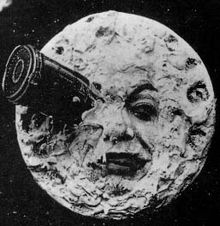 |
| The snow ballet from Offenbach's Le Voyage dans la Lune. |
As movie buffs know, filmmaking pioneer Georges Méliès wrote and directed a short film in 1902 called Le Voyage dans la Lune, based loosely on Jules Verne's novel De la Terre à la Lune. With its innovative use of animation and special effects, Méliès' film (viewable here) was a sensation.
 |
| Georges Melies' moon. |
Theatrical adaptations of Verne's novel were nothing new. In 1875 Jacques Offenbach, "the Mozart of the boulevardiers," composed Le Voyage dans la Lune, an opéra-féerie in four acts. Opéra-féerie was a sub-genre of operetta, featuring fantastical plots, lavish staging, and stunning visual effects. For the theatre-going public, Le Voyage was the science fiction of its time.
Offenbach's
version of Le
Voyage dans la Lune
opened in Paris at the Théâtre de la Gaîté, complete with a huge,
illuminated model of the moon outside the theatre. Despite
accusations of plagiarism by Jules Verne, the show was a big success,
thanks in part to Offenbach's scintillating music, in part to its
over-the-top staging which included a gigantic cannon blasting off a
spaceship, and a spectacular snow ballet. The cannon can be seen
below in the programme for the London premiere in 1876.
The
popularity of Offenbach's works in London ignited an English operetta
craze, which made Gilbert & Sullivan possible, necessary, and --
to G & S and impresario Richard D'Oyly Carte -- highly
profitable. Iolanthe,
more satiric than Le
Voyage
and one of G & S' best, is a toned-down, cross-Channel cousin to
opéra-féerie.
 |
| Jacques Offenbach (1819-1880) |
Offenbach often took impish delight in assigning his singers with odd-sounding words or phrases. In the Final de la neige from Le Voyage de la Lune, playable below, he makes an unsingable syllable the centerpiece of a sparkling ensemble number.
As
the clip begins, the space-travellers from Earth have captured the
moon princess, prompting her father, the moon king, to order his
subjects to capture the invaders. At 0:40 the Earthlings are
shocked, shocked
to discover -- it's cold on the moon. What an extraordinary country,
says one. Cast and chorus are frozen to the bone. What's more, to
their horror, the snow is falling thick and fast ("il neige!").
General panic. You'd think a people clever enough to devise a
cannon-propelled spaceship would have thought to bring overcoats and
galoshes.
The
falling snow is deftly described in the orchestra's descending
strings starting at 1:34, leading us to the Act Two
finale
at 2:07, a delightful rondo in which the shivering Earthlings bemoan
the appalling turn in the weather and the cruelty of nature, singing
long, graceful runs on the word "Brrrrrrrrr!" (in harmony
yet!) -- a surefire show-stopper.



No comments:
Post a Comment